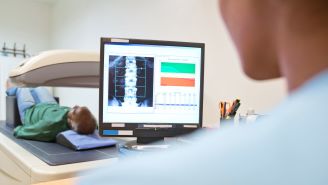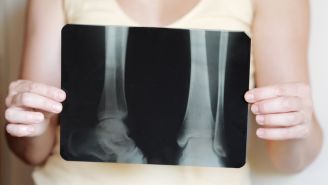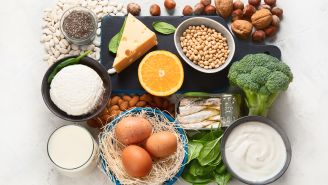About half of women and a quarter of men will break a bone sometime in their lives because they have osteoporosis, a condition characterized by a thinning of the bones, and other bone diseases. With osteoporosis, bones become more porous and less dense, making them weaker and more likely to break.
If you’ve been loading up on bone-friendly foods such as calcium-rich dairy products, fish, fruits, veggies and exercising regularly, you’re on the right track. But, you may be surprised to learn that certain foods, medications and habits can actually weaken your bones. Here are four things you should avoid at all costs.
Salt
Studies have shown that foods high in sodium may contribute to osteoporosis. While researchers don’t know exactly why, experts say that as your body works to remove excess salt, it gets rid of calcium in the process. This is bad news for your bones since they need calcium to stay strong and dense.
“There’s so much added salt in a lot of the things you’re eating, and many times, you don’t even realize it,” says orthopedic surgeon Ian Dickey, MD, of Presbyterian/St. Luke’s Medical Center.
Your best bet is to steer clear of salty foods, such as deli meats, processed, frozen or canned foods with added sodium, sauces and marinades. Even cottage cheese and some breakfast cereals have added sodium, so read those nutrition labels, and try to keep your total sodium intake to no more than 2,300 milligrams per day, 1,500 if you can.
“1,500 milligrams of sodium is a good number to shoot for,” says Dr. Dickey.
Soda
Colas give a one-two punch to your bones thanks to the damaging effects of phosphoric acid and caffeine. Studies have shown that the phosphoric acid in some soft drinks may leach calcium from the bones, especially in women.
Caffeine in colas has also been shown to contribute to calcium loss. Some experts say that people who consume soda are more likely to experience bone injuries simply because soft drinks are taking the place of more nutritious beverages, like milk. The National Osteoporosis Foundation recommends that people already diagnosed with osteoporosis limit their cola consumption to no more than five per week.
Antacids and heartburn medications
Some common over-the-counter (OTC) and prescription medications for heartburn and acid reflux have been linked to a higher risk of bone fracture if taken for longer than a year, or in high doses, according to the Food and Drug Administration. Proton pump inhibitors, including Nexium, Prevacid and Prilosec, have been called out, specifically.
“People who are on a fairly consistent or significant amount of these medications have to be careful because they’re changing the pH and the absorption ability of not only the stomach, but the intestines where most of the stuff is taken in,” says Dickey.
And if you’re taking an OTC antacid that also contains aluminum, it too can lower your calcium levels, making you more susceptible to bone loss and fracture. If you're taking regular medication for your acid reflux or GERD, and you’re concerned about your bone health, talk to your doctor about the best treatment options for you.
Smoking
As if you needed another reason to quit, this bad habit also increases your fracture risk, according to the National Institute of Arthritis and Musculoskeletal and Skin Diseases.
Older men and women who smoke are especially susceptible to bone loss. As you age, your body reabsorbs calcium and phosphate minerals from your bones, instead of keeping the minerals in your bones. When your bones start to lose these minerals, they become weak and brittle. And although more research is needed to completely identify the link between smoking and osteoporosis, experts believe tobacco use is associated with decreased bone density. Smoking may also make it more difficult for your bones to heal after a fracture. Not to mention that smokers may also be increasing their risk for heart disease, chronic lung disease and diabetes, too.
Regular walking is one of the best things a person with osteoporosis can do to improve bone health, says Dickey. Once you’ve mastered a good walking plan, try stair climbing—it’s a good mix of cardiovascular exercise and strength training. He recommends that you consider eating more calcium-rich foods that boost bone health like salmon, sardines, oranges, fortified orange juice, kale, white beans, seaweed, almond milk and sesame seeds. A daily dose of the sunshine vitamin, vitamin D, can also help improve bone health because it helps your body more readily absorb calcium. Together you and your healthcare provider can determine an exercise and eating plan that’s right for you.





